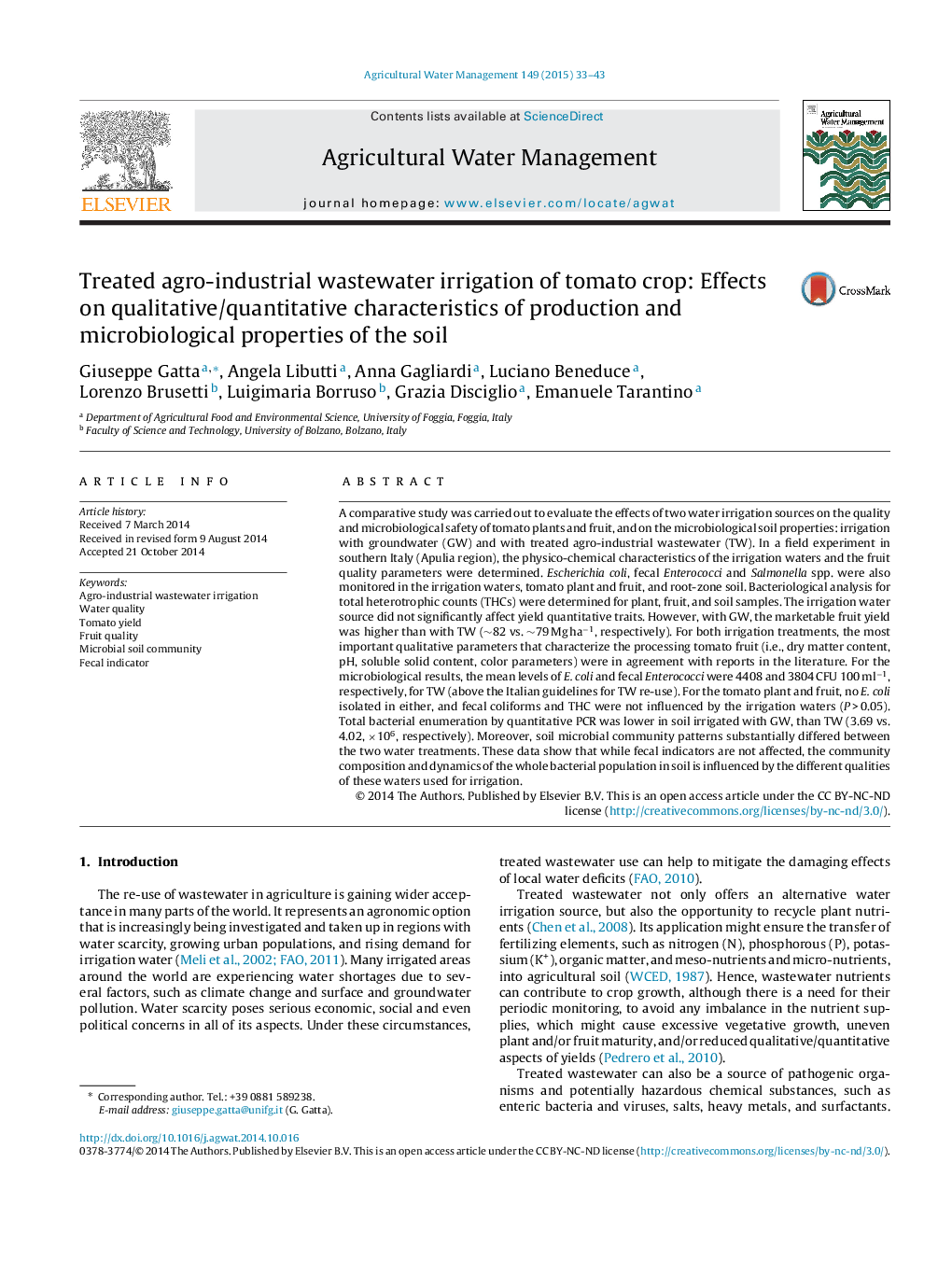| کد مقاله | کد نشریه | سال انتشار | مقاله انگلیسی | نسخه تمام متن |
|---|---|---|---|---|
| 6363862 | 1622930 | 2015 | 11 صفحه PDF | دانلود رایگان |
عنوان انگلیسی مقاله ISI
Treated agro-industrial wastewater irrigation of tomato crop: Effects on qualitative/quantitative characteristics of production and microbiological properties of the soil
ترجمه فارسی عنوان
آبیاری فاضلاب زراعتی صنعتی محصولات زراعی گوجه فرنگی: تاثیر بر ویژگی های کیفی / کمی تولید و خواص میکروبیولوژیکی خاک
دانلود مقاله + سفارش ترجمه
دانلود مقاله ISI انگلیسی
رایگان برای ایرانیان
کلمات کلیدی
آبیاری فاضلاب صنعتی صنعتی، کیفیت آب، عملکرد گوجه فرنگی، کیفیت میوه، جامعه خاک میکروبی، شاخص مدفوع،
موضوعات مرتبط
علوم زیستی و بیوفناوری
علوم کشاورزی و بیولوژیک
علوم زراعت و اصلاح نباتات
چکیده انگلیسی
A comparative study was carried out to evaluate the effects of two water irrigation sources on the quality and microbiological safety of tomato plants and fruit, and on the microbiological soil properties: irrigation with groundwater (GW) and with treated agro-industrial wastewater (TW). In a field experiment in southern Italy (Apulia region), the physico-chemical characteristics of the irrigation waters and the fruit quality parameters were determined. Escherichia coli, fecal Enterococci and Salmonella spp. were also monitored in the irrigation waters, tomato plant and fruit, and root-zone soil. Bacteriological analysis for total heterotrophic counts (THCs) were determined for plant, fruit, and soil samples. The irrigation water source did not significantly affect yield quantitative traits. However, with GW, the marketable fruit yield was higher than with TW (â¼82 vs. â¼79 Mg haâ1, respectively). For both irrigation treatments, the most important qualitative parameters that characterize the processing tomato fruit (i.e., dry matter content, pH, soluble solid content, color parameters) were in agreement with reports in the literature. For the microbiological results, the mean levels of E. coli and fecal Enterococci were 4408 and 3804 CFU 100 mlâ1, respectively, for TW (above the Italian guidelines for TW re-use). For the tomato plant and fruit, no E. coli isolated in either, and fecal coliforms and THC were not influenced by the irrigation waters (P > 0.05). Total bacterial enumeration by quantitative PCR was lower in soil irrigated with GW, than TW (3.69 vs. 4.02, Ã106, respectively). Moreover, soil microbial community patterns substantially differed between the two water treatments. These data show that while fecal indicators are not affected, the community composition and dynamics of the whole bacterial population in soil is influenced by the different qualities of these waters used for irrigation.
ناشر
Database: Elsevier - ScienceDirect (ساینس دایرکت)
Journal: Agricultural Water Management - Volume 149, February 2015, Pages 33-43
Journal: Agricultural Water Management - Volume 149, February 2015, Pages 33-43
نویسندگان
Giuseppe Gatta, Angela Libutti, Anna Gagliardi, Luciano Beneduce, Lorenzo Brusetti, Luigimaria Borruso, Grazia Disciglio, Emanuele Tarantino,
